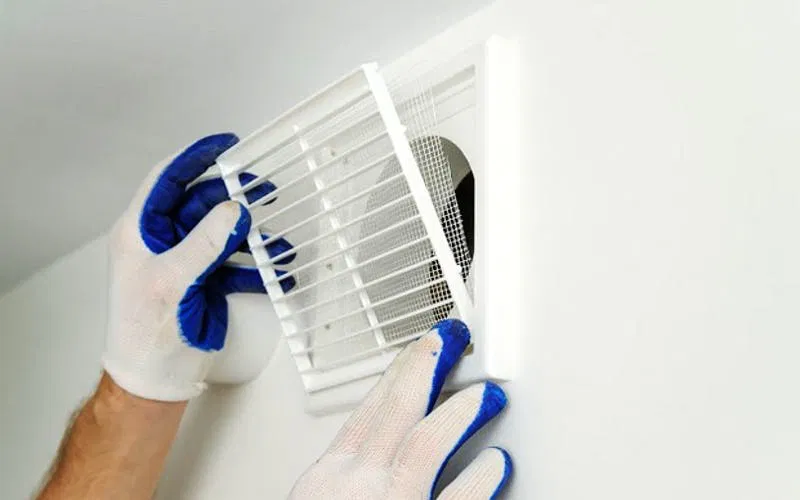Have you noticed those little fluffs that come out of an air duct every time you turn on the forced air heating or air conditioning (HVAC)? Have you noticed dust or even hair or (pet) fur on an air vent or grill? Is the exhaust grill in your bathroom or toilet covered in dust? These are signs that your air duct system needs a deep cleaning. Inside your ventilation system, fine dust collects on the surfaces of the air ducts, grills, fans, blowers, and heat exchangers. Debris from dead skin, hair, and other organic soils in turn settles on the dust that has accumulated inside the ventilation system, creating a breeding ground for bacteria, mold, dust mites, and allergens. Air filters remove most of these germs from the circulating air, but not from all parts of the ventilation system, so we recommend checking your air ducts regularly to make sure that dirt is not building up.
The Five Main Signs of Clogged Air Ducts
- Open a vent and look into the air duct. Check that no dirt, debris, or microbiological contaminants have accumulated in the duct.
- Look for dirt buildup on the return grilles, especially thick, fluffy dust deposits.
- Remove the air filter from the ventilation unit. A very dusty filter indicates that air circulation is impeded. This obstruction in turn generates additional dust accumulation in the return ducts because air circulation is slowed down there (airflow function of the air ducts before the filter).
- Open the fan assembly or blower unit. Inspect the fan, motor, and electrical circuit for dust buildup. The more dust you see, the more serious the problem.
- Look at the heat exchanger. If it is dusty or if dust is sticking to the edges of the housing, the air filter is not working properly.
Each of these indicators shows that your HVAC system and air ductwork are suffering the negative consequences of excess dust and dirt.
The five main consequences of clogged air ducts
Why are a few dust and dirt deposits problematic? Dirty air ducts cause a variety of problems, ranging from increased energy consumption and associated costs to health issues.
- Dirt and dust interfere with the heating or cooling functions of your ventilation system. In the winter, dirty heat exchangers do not heat efficiently. In the summer, contaminated condensers are unable to cool the ambient air properly. In both cases, the ventilation system will take longer to do its job. It will therefore use more energy to heat or cool the indoor climate.
- Dirt and dust impede airflow. Let’s say your ventilation system has a good heating or cooling function. However, if the fan is limited by increased resistance due to dirt buildup in or on the fan or even further downstream in the ventilation system, the heated or cooled air cannot circulate efficiently throughout the building. As a result, the system will take longer and longer to perform its role and will consume more energy.
- The longer an HVAC system is in service, the more wear it experiences, as with all systems with moving parts. Water pumps, burners, and motor bearings are particularly affected. Points 1 and 2 described above increase energy consumption and accelerate wear and tear on the ventilation system.
- Dust is not only made up of fine particles, but also dead skin debris, particles from pets, microorganisms, pollen, fungal spores, and even rodent feces. When this dust contaminates the system, it can provide a breeding ground for bacteria, dust mites, and other parasites.
- Dirt and dust spread more quickly throughout your home when your air ducts are dirty. No matter how hard you dust and clean your home, fine dust particles, including dangerous allergens, quickly travel from room to room and settle on tables, smartphones, and toys.
Top 5 Benefits of Air Duct Cleaning
You can avoid many technical and health problems with an annual visit from a professional air duct sanitation professional who will inspect your ventilation system and advise you to have the installation cleaned when necessary. You will also reduce your heating and cooling costs:
- A more efficient and reliable HVAC system.
- Reduced wear-related maintenance costs and extended life of your ventilation system.
- Better energy efficiency, resulting in lower energy bills.
- Less risk of respiratory problems or allergic reactions.
- Less dust and therefore less cleaning effort for your interior.
It is not in your best interest to carry out the cleaning operations of your ventilation ducts yourself. These tasks are not suitable for an inexperienced person who uses inappropriate equipment. A deep cleaning involves reaching at least 95% of the ventilation system. Such results are only possible with industrial cleaning equipment and the intervention of technological tools. For all these reasons, you should only entrust your cleaning project to a company capable of offering sufficient guarantees.
Read Other: Install Air Conditioning in an Apartment?




